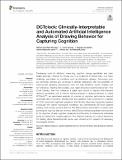| dc.contributor.author | Souillard-Mandar, William | |
| dc.contributor.author | Penney, Dana | |
| dc.contributor.author | Schaible, Braydon | |
| dc.contributor.author | Pascual-Leone, Alvaro | |
| dc.contributor.author | Au, Rhoda | |
| dc.contributor.author | Davis, Randall | |
| dc.date.accessioned | 2022-06-14T13:20:03Z | |
| dc.date.available | 2022-06-14T13:20:03Z | |
| dc.date.issued | 2021 | |
| dc.identifier.uri | https://hdl.handle.net/1721.1/143116 | |
| dc.description.abstract | <jats:p>Developing tools for efficiently measuring cognitive change specifically and brain health generally—whether for clinical use or as endpoints in clinical trials—is a major challenge, particularly for conditions such as Alzheimer's disease. Technology such as connected devices and advances in artificial intelligence offer the possibility of creating and deploying clinical-grade tools with high sensitivity, rapidly, cheaply, and non-intrusively. Starting from a widely-used paper and pencil cognitive status test—The Clock Drawing Test—we combined a digital input device to capture time-stamped drawing coordinates with a machine learning analysis of drawing behavior to create DCTclock™, an automated analysis of nuances in cognitive performance beyond successful task completion. Development and validation was conducted on a dataset of 1,833 presumed cognitively unimpaired and clinically diagnosed cognitively impaired individuals with varied neurological conditions. We benchmarked DCTclock against existing clock scoring systems and the Mini-Mental Status Examination, a widely-used but lengthier cognitive test, and showed that DCTclock offered a significant improvement in the detection of early cognitive impairment and the ability to characterize individuals along the Alzheimer's disease trajectory. This offers an example of a robust framework for creating digital biomarkers that can be used clinically and in research for assessing neurological function.</jats:p> | en_US |
| dc.language.iso | en | |
| dc.publisher | Frontiers Media SA | en_US |
| dc.relation.isversionof | 10.3389/FDGTH.2021.750661 | en_US |
| dc.rights | Creative Commons Attribution 4.0 International license | en_US |
| dc.rights.uri | https://creativecommons.org/licenses/by/4.0/ | en_US |
| dc.source | Frontiers | en_US |
| dc.title | DCTclock: Clinically-Interpretable and Automated Artificial Intelligence Analysis of Drawing Behavior for Capturing Cognition | en_US |
| dc.type | Article | en_US |
| dc.identifier.citation | Souillard-Mandar, William, Penney, Dana, Schaible, Braydon, Pascual-Leone, Alvaro, Au, Rhoda et al. 2021. "DCTclock: Clinically-Interpretable and Automated Artificial Intelligence Analysis of Drawing Behavior for Capturing Cognition." Frontiers in Digital Health, 3. | |
| dc.contributor.department | Massachusetts Institute of Technology. Computer Science and Artificial Intelligence Laboratory | |
| dc.relation.journal | Frontiers in Digital Health | en_US |
| dc.eprint.version | Final published version | en_US |
| dc.type.uri | http://purl.org/eprint/type/JournalArticle | en_US |
| eprint.status | http://purl.org/eprint/status/PeerReviewed | en_US |
| dc.date.updated | 2022-06-14T13:00:37Z | |
| dspace.orderedauthors | Souillard-Mandar, W; Penney, D; Schaible, B; Pascual-Leone, A; Au, R; Davis, R | en_US |
| dspace.date.submission | 2022-06-14T13:00:38Z | |
| mit.journal.volume | 3 | en_US |
| mit.license | PUBLISHER_CC | |
| mit.metadata.status | Authority Work and Publication Information Needed | en_US |
